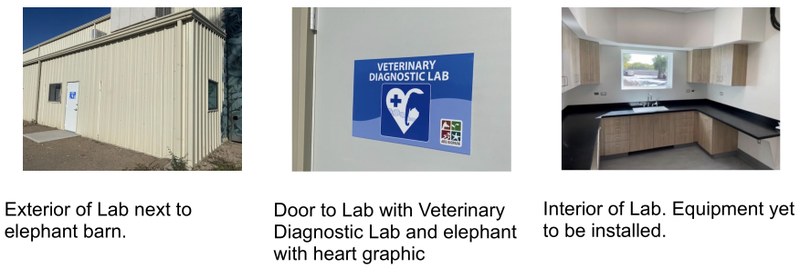
ABQ BioPark Investing in Cutting-Edge DNA Lab to Quickly Test Elephants for Often-Fatal Virus
Only seven zoo labs in the country exist to conduct on-site EEHV testing
ALBUQUERQUE - ABQ BioPark has begun construction on a cutting-edge, on-site DNA testing lab that can provide early warning of an active infection of a common, but often deadly, elephant virus.
The ABQ BioPark Veterinary Diagnostic Lab, will be just the eighth such zoo lab in the nation, and it’s a deeply personal commitment by the BioPark, which has lost three young elephants – Thorn, Jazmine and Daizy – to elephant endotheliotropic herpesvirus, or EEHV, in recent years.
The lab will conduct on-site PCR (polymerase chain reaction) DNA testing that can identify an active EEHV infection, as well as the specific type of virus in an elephant’s blood, in just a few hours. While rapid diagnosis and genetic information doesn’t prevent infection, it quickly informs animal care staff to begin medical treatment when an infection is active. Real-time testing also alerts staff if any elephants are actively shedding the virus so appropriate actions can be taken.
“This laboratory is a significant step in providing breakthrough care for our elephants,” said Dr. Carol Bradford, D.V.M., DACZM, senior veterinarian at ABQ BioPark. “Through advanced science, our team will gain valuable time in treating this serious virus and helping to ensure the well-being of the rest of the herd.”
EEHV is found in African and Asian elephants in the wild and in zoological care. While it often doesn’t cause illness, when it does it can cause ruthless hemorrhagic disease and turn fatal in a matter of days.
Few institutions are equipped to conduct these special DNA tests. Currently ABQ BioPark must ship blood samples to the Smithsonian’s National Zoo and Conservation Biology Institute’s National Elephant Herpes Lab near Washington, D.C., to be tested for the virus. The long distance means a longer wait for information necessary for tests and treatment.
The zoo’s animal care experts work with the elephants to voluntarily participate in their care by providing regular blood samples and participating in trunk washes, which is a method to collect mucous and particles from inside of the trunk, for testing. Once the new laboratory is fully operational, they will have test results sooner.
“Having an EEHV Point-of-Care laboratory at the ABQ BioPark will allow them to get rapid answers for EEHV samples.” said Erin Latimer, lab manager at the Smithsonian’s National Elephant Herpes Lab. “This allows us to collaborate with them on complex cases and research projects; our partnership will help assure continuing excellent elephant health in the United States.”
The virus was first identified in the 1990s. EEHV can remain latent in adult elephants, but when a naive calf is exposed for the first time, under some circumstances, the virus can cause a systemic (whole-body) illness. It is not known at this time why some calves may have a fatal reaction and others do not. The virus is most dangerous to Asian elephants while they are young up to about 8 years of age, and it’s believed that adult elephants are less susceptible because their immune system has had more opportunity to develop antibodies.
There’s no cure yet for herpesviruses, although antiviral treatments have shown some promise, and vaccine development is ongoing.
While key questions remain about EEHV, the body of knowledge continues to grow as elephant experts and scientists work tirelessly to learn more about the virus. Advances in technology – including the BioPark’s new lab – are helping to more quickly diagnose active infections so treatment can begin.
In addition to reduced test time for Albuquerque’s elephants, the BioPark EEHV lab will be a regional resource for animal care experts and help other accredited zoos in surrounding states with quicker response times for emergency EEHV testing for their elephants. The BioPark’s longer term goal, within the next three years, is to expand the laboratory to serve as a resource for monitoring, testing and diagnostics for any number of diseases, from COVID-19 to shigella and more.
Funding for the lab comes from a combination of donations from the New Mexico BioPark Society and Albuquerque’s Gross Receipts Tax. Donations are being accepted to help maintain the lab at https://www.bioparksociety.org/main/eehv. Residents also can vote to support any future extensions of the GRT to help fund important initiatives like the EEHV lab.
About the BioPark
The ABQ BioPark is a living environmental park that protects the natural world and connects communities with nature. It is a refuge for thousands of animals and plants cared for by zoological, marine and botanical experts who lead significant science-based conservation work in New Mexico and around the world. The BioPark consists of four distinct areas: ABQ BioPark Aquarium, ABQ BioPark Botanic Garden, ABQ BioPark Zoo, and Tingley Beach.
The ABQ BioPark is an accessible facility and a division of the Department of Arts & Culture, City of Albuquerque, Tim Keller, Mayor. We are accredited by the Association of Zoos and Aquariums and a member of the American Public Gardens Association. In 2023, ABQ BioPark earned the American Humane Certified™ seal of approval for its excellent treatment of animals and commitment to conservation. For more information, visit www.abqbiopark.com or call 311 locally or 505-768-2000 (Relay NM or 711).
